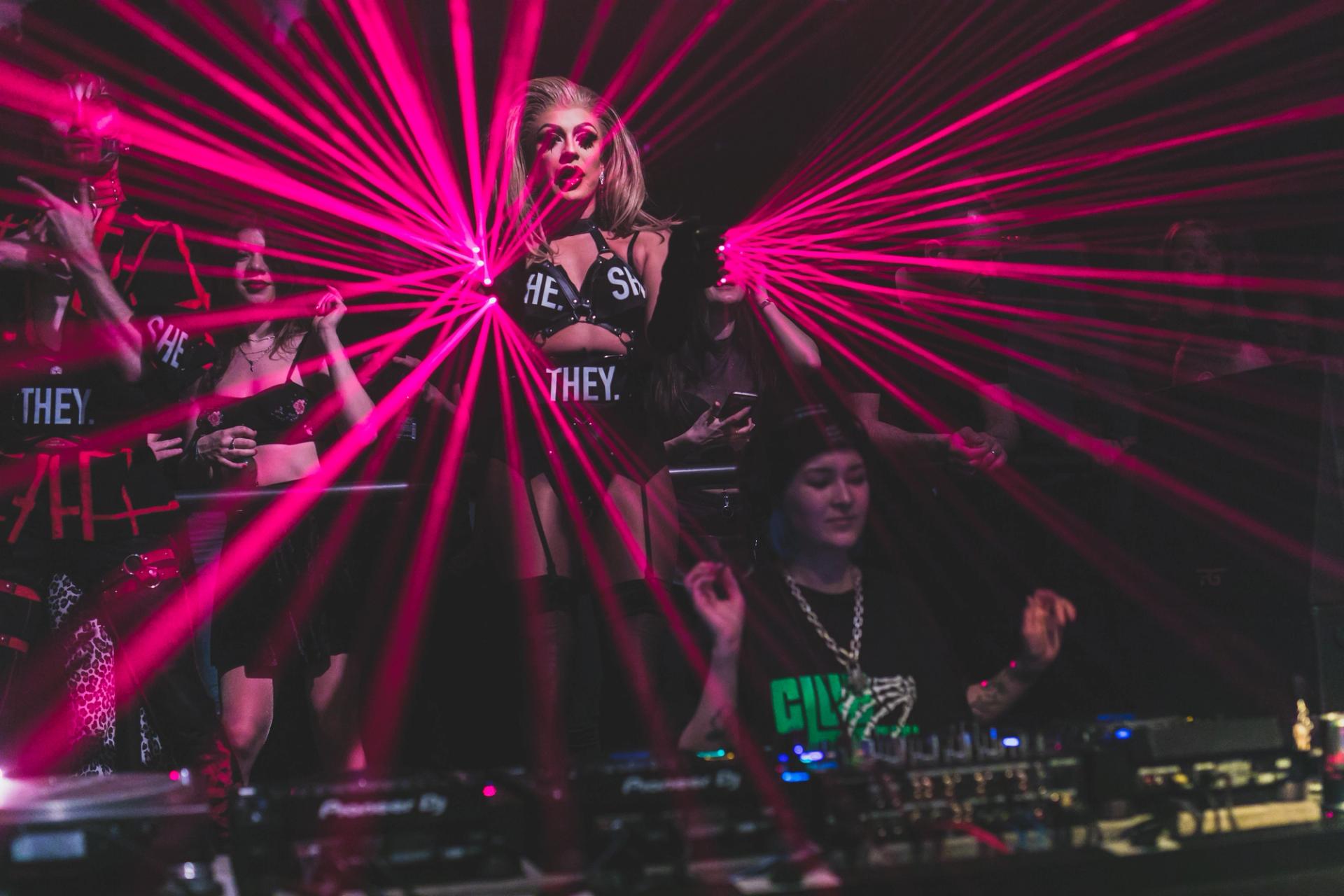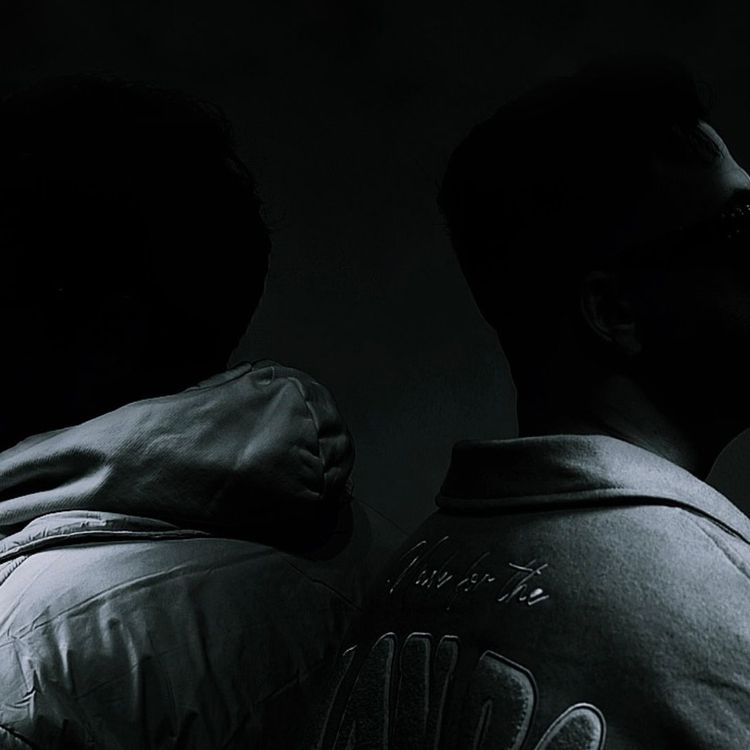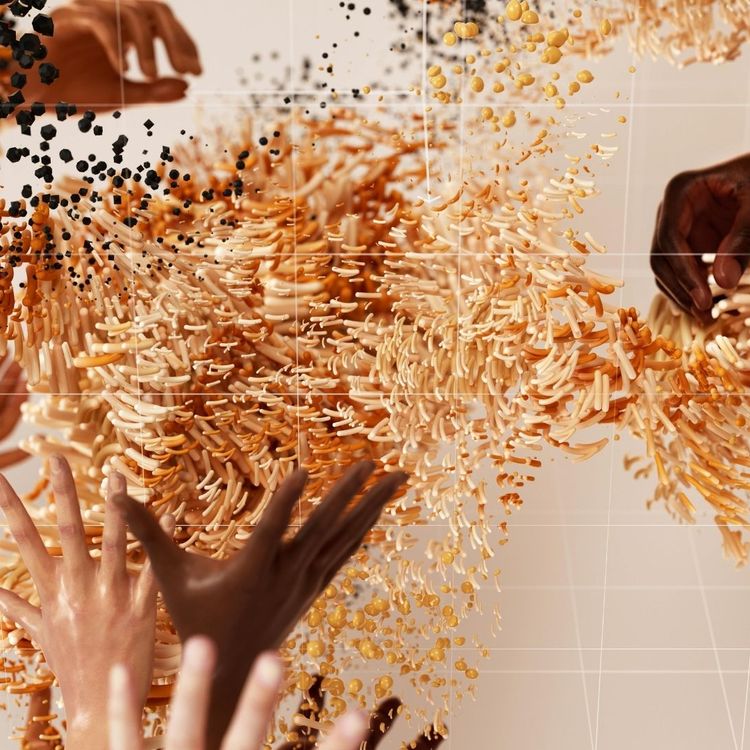Event Brand Spotlight
There's a notion in the electronic music scene that we collectively create space for everyone to feel safe, seen, respected, loved, and accepted. Yet, despite this grandiose vision of a democratic dancefloor, when the vast majority of key decision-makers and entertainers don't reflect its diversity, it's difficult to have confidence in a truly inclusive space. Sophia Kearney and Steven Braines, founders of the record label, fashion line, and events brand HE.SHE.THEY recognized this disparity and sought to return dance music to its ideological roots.
Their events span over a dozen countries and offer refuge for radical self-expression. Putting principle into practice, their lineups reflect the dancefloor's diversity featuring artists like UNIIQU3, Honey Dijon, Peaches, SYREETA, and Miss Kitten. And their genre-spanning record label puts on a wide range of artists from notable to next-gen. Releases include music from the likes of Baby Weight, Sister Bliss, Nikki Nair, Chloè Robinson, Catz 'N' Dogz, Mz Worthy, and Anja Schneider. Above all, they've created uniquely brave spaces that encourage bold and open expression.

Sophia Kearney & Steven Braines
Fiona Garden
"HE.SHE.THEY was born from a frustration of what we were noticing about the dancefloors around the world as we were traveling with our artists with a vantage point from the booth of who was in the club, who was in the green room, who was making the decisions, who was at the table and how that was reflecting the culture. Quite often, I was the only female manager in the room at the time." Kearney tells Gray Area.
Before founding the groundbreaking brand, they were (and still are) equal partners in The Weird & The Wonderful, "an international, multi-faceted talent consultancy, record label, events curation & management collective." They work with a diverse roster of artists, including ghetto tech architect DJ Deeon, Queer icon Wax Wings, and celebrated superstar DJ/producer Maya Jane Coles.
"Quite often the dance floors felt very straight white male heavy in terms of the crowd and Maya often being the only female let alone the only queer female on a lineup," Kearny says. "And we couldn't understand considering the roots of electronic music, why the dancefloors had become the way they've become. I would constantly be invited to panels at IMS [and] Miami Music Week, to discuss the lack of diversity or intersectionality, but it just kind of felt that nothing was being done."
"And then it was like, well, why [did we] expect everyone else to do it, when we could just do it," Braines adds. "Rather than being armchair critics, we should build it better, in our own image of what we want, right? Not that we're the only people who do diversity and inclusion."

HE.SHE.THEY Ministry of Sound
Gemma Bell
Kearney admits that despite how they identify, they both benefit from their social standing. "We're also privileged as well, both being cis white people. Despite me being a woman and despite seeing Steven being queer, we also have an advantage in certain spaces. And we needed to do something about this to push an agenda of far more inclusivity than we were seeing."
The pair's background in dance music made them uniquely positioned to do so.
Kearney discovered her passion for working in music on a girl's trip to Glastonbury in college. While camping on a hill behind the festival's iconic Pyramid Stage, she could see the backstage hustle and bustle. It was mind-blowing that an entire world existed behind the speakers. "There are people here on site who didn't have to wait five hours for a ticket who have a purpose and are meant to be here and that kind of just blew my head wide open in one moment," she fondly remembers. "I came home, covered in mud, and changed all of my university options to music management."

HE.SHE.THEY Ibiza
La Skimal
She got her first job at William Morris Agency after emailing passionate cover letters to hundreds of industry heads in her first-year post college. Routing tours for adult contemporary artists like Morcheeba and Macy Gray was an education but not something she was passionate about. She ended up working with Swedish House Mafia's former manager, Amy Thompson, in that exciting moment when EDM was cresting. Still, it wasn't her favorite kind of dance music, so she left with no prospects until a friend introduced her to Braines. They immediately felt a kinship.
"We had this very weird fake slash real interview situation. It was bizarre. But I had this feeling," she explains. She had a job offer at a major label on the line. Yet, despite knowing she could work her way up there, Steven seemed to offer something more nuanced and authentic. "For some reason, I felt like I needed to pursue what might happen if we work together."

Gemma Bell
Steven grew up in Sunderland, an industrial town in England. When he started clubbing, it was the first time he'd been around such a diverse group of people. "I guess at the time, I lived in quite a heteronormative cis-white culture. So that was what I loved about the club ... it was about all different types of people coming together."
After a summer "dancing on podiums" in Ibiza, he fell into running club nights and then music journalism. When he met Kearney, he'd already spent years on the management side of the business and ran the Weird and the Wonderful independently with a cadre of artists like Maya Jane Coles, Magda, and Tale of Us. "It just really worked," he says about meeting her. "We had the same kind of morality and the same music head in general,"
As their artists blossomed into superstars, Kearney and Braines were sought-after panelists at industry events. Yet with each passing conference, it became clear that the industry wasn't well. Years of explosive growth in dance music had changed the power dynamics of the boardroom and, thus, the dancefloor. They didn't sync up with changing sociodynamics of the world. Steven and Sophia felt they could create more than a safe space.
"HE.SHE.THEY isn't a safe space necessarily, we call it a brave space, because it's about everybody. It's not just about one kind of protected group. It's for gay people and straight people and bisexual people and pansexual people and asexual people and Black, white, Asian, Turkish, Arabic, male, female, non-binary, like, everybody in a room. The idea is that no one person holds all the power," Braines explains.
"I think it's really hard to call any spaces completely safe if you're asking such a wide range of people to come together in a nightlife setting where people are consuming potentially various intoxicants. What we can do, is do everything we can to make it a safer space," Kearney adds.
HE.SHE.THEY has been instrumental in moving the needle towards a better nightlife scene—they've fought for systematic changes in the nightclubs they partner with. Many practices—like fabric's gender-neutral bathrooms—have influenced venues to change course even after HE.SHE.THEY has left the building.
"For some clubs, to have a 50/50 gender balance of just men and women in the room is a huge step forward for them. And for some, it's about bringing the queer community on a Saturday night to their venue where normally it would be a Thursday or Sunday or not at all," Kearney explains. "And there's all different pockets of improvement that people are happy to see. So sometimes you might come to a show, and it isn't this complete carnival queer extravaganza water wall. But there is so much change happening in that room. And also, there are so many people who are coming out of their shells in all different ways.
"We are really asking everyone to be brave and come together and sort of share these moments and hopefully, if it just means that that, say a black trans dancer of ours has a wonderful conversation with a straight white guy at the bar. And that leads to someone somewhere not getting stared at in the street, or not being verbally abused—we're never even going to know if any of those things are necessarily happening or on what scale. But music and culture has always been something that could change the world," Kearney says.
"To be honest, it's, it's not about making money," Braines continues. Despite holding events in some of the world's most celebrated nightlife institutions like Amnesia Ibiza, Ministry of Sound, fabric, and more, HE.SHE.THEY is not a cash cow. Yet they press on because "It's about genuinely trying to show people that this can work. The term DJ has no gender, has no race. We only apply that because it's been taken out of the hands of Black and Brown queer people and that was one of the things that HE.SHE.THEY did, was try to redress."

Gemma Bell
HE.SHE.THEY celebrated their milestone fifth birthday in 2023. And looking back on half a decade of parties, releases, and hard-fought battles to return the dancefloor to its purest form, Kearney reflects with support for everyone doing something to make even the most incremental change.
"There are other people doing amazing things and amazing nights and pushing an inclusive message. And may they all exist and thrive because there is space for everyone to push this message. Nobody owns diversity and inclusion. It's for everybody to talk about and for everybody to be a part of."









